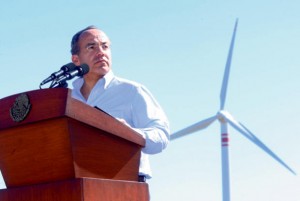Mexico Sets Legally Binding Carbon Reduction Targets
 Since Mexico’s legislative body passed sweeping climate change legislation on April 19, Mexico joins the UK as the only two countries in the world with legally binding emissions goals to combat climate change.
Since Mexico’s legislative body passed sweeping climate change legislation on April 19, Mexico joins the UK as the only two countries in the world with legally binding emissions goals to combat climate change.The new law will reduce the country’s carbon emissions, end fossil fuel subsidies, and establish a voluntary carbon trading market. This law builds on Mexico’s previous commitments to action on climate change, and reflects on the country’s green leadership on the international stage it prepares to host the upcoming G20 leaders’ summit in June.
Adrián Fernández, a consultant for the Latin American Initiative and former President of the National Ecology Institute, recently discussed the importance of Mexico’s new climate change law during a briefing 2012 by the Joint Center for Political and Economic Studies in Washington DC:
[Mexico] now has a framework that allows governments at national and local levels to set aside budgets with clear earmarks towards climate change, and to create new investments for climate mitigation and adaptation … pushing [Mexico] into the spotlight and, under international scrutiny, [Mexico] will be held accountable to its people and the international community.
After several years of debate and revision, the bill passed Mexico’s lower house on April 12, with a vote of 128 for and 10 against. Mexico’s Senate unanimously passed the legislation on April 19, and President Felipe Calderon, who has championed immediate action to stop global warming, is expected to sign the bill into law soon.
As President Calderon prepares to host the next G20 summit in June, his administration will make climate change and sustainable development “priorities” during the meeting under a broad Green Growth theme.
With 75 percent of the world’s GDP, the G20 is responsible for 75 percent of energy consumption and greenhouse gas emissions. Bringing together finance ministers from these countries is essential for putting sustainability at the core of economic recovery and for figuring out how to mobilize significant resources for international climate finance.
Today, Mexico is the only developing country in the world to have passed binding climate change legislation.
While the United Nations Framework Convention on Climate Change (UNFCCC) designates Mexico a “non-Annex I country,” or a developing country — thus not requiring it to make greenhouse gas reduction targets — Mexico’s non-Annex I status is not reflective of its economic size (11th) or contribution to global greenhouse gasses (also 11th).
Given its size and commitment to sustainable growth, Mexico is well positioned to facilitate cooperation among major developing countries such as China and industrialized countries like the United States as they seek consensus on international climate finance during the upcoming summit.
UNFCCC talks have previously stalled with industrialized and developing countries “locked into definitions” that hinder global cooperation. Mexico can use the G20 Summit to build on its previous success from the 2010 UN talks in Mexico that resulted in the Cancun Agreements. By passing climate law legislation, Mexico is acting demonstrating continuing leadership on sustainable development on the international stage.
According to Rodrigo Gallegos, the Director of Climate and Technology at the Mexico Institute for Competitiveness, and representative for the business community who also participated in the briefing, the climate legislation will simplify emissions regulations throughout the country and set a new institutional and regulatory framework that will create more certainty for Mexico’s business environment. As a result, Mr. Gallegos notes, Mexico’s business sector is supporting the climate change law:
Most of the private sector and chamber are in favor of the law and have changed positions over the last two years. So, having said that, there is a very positive sense of perception of the law among businesses.
Mr. Gallegos believes that with reduced long-term investment uncertainty, Mexico can become a destination for green technology and innovation.
As a backdrop to Mexico’s G20 summit and climate change legislation, the country is concurrently dealing with one of the worst droughts on record for several areas of the country. More than half of Mexico’s territory is experiencing drought, and over 3.7 million acres of farmland have been lost.
The federal government has spent billions of dollars on food, water, and other aid relief in some of the most afflicted areas in 19 of Mexico’s 31 states. Severe drought is one of the most pressing problems caused by climate change — likely severely hindering global food production over the coming decades.
Mexico’s climate legislation may not bring sorely needed rain in the immediate future. But it is a great step in the right direction for international climate sustainability.
You can return to the main Market News page, or press the Back button on your browser.

